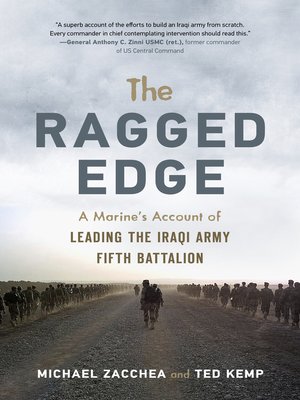The Ragged Edge
ebook ∣ A US Marine's Account of Leading the Iraqi Army Fifth Battalion
By Michael Zacchea

Sign up to save your library
With an OverDrive account, you can save your favorite libraries for at-a-glance information about availability. Find out more about OverDrive accounts.
Find this title in Libby, the library reading app by OverDrive.



Search for a digital library with this title
Title found at these libraries:
| Loading... |
Deployed to Iraq in March 2004 after the overthrow of Saddam Hussein, US Marine Michael Zacchea thought he had landed a plum assignment. His team's mission was to build, train, and lead in combat the first Iraqi Army battalion trained by the US military.
Quickly, he realized he was faced with a nearly impossible task. With just two weeks' training based on outdated and irrelevant materials, no language instruction, and few cultural tips for interacting with his battalion of Shiites, Sunnis, Kurds, Yazidis, and others, Zacchea arrived at his base in Kirkush to learn his recruits would need beds, boots, uniforms, and equipment. His Iraqi officer counterparts spoke little English. He had little time to transform his troops—mostly poor, uneducated farmers—into a cohesive rifle battalion that would fight a new insurgency erupting across Iraq.
In order to stand up a fighting battalion, Zacchea knew, he would have to understand his men. Unlike other combat Marines in Iraq at the time, he immersed himself in Iraq's culture: learning its languages, eating its foods, observing its traditions—even being inducted into one of its Sunni tribes. A constant source of both pride and frustration, the Iraqi Army Fifth Battalion went on to fight bravely at the Battle of Fallujah against the forces that would eventually form ISIS.
The Ragged Edge is Zacchea's deeply personal and powerful account of hopeful determination, of brotherhood and betrayal, and of cultural ignorance and misunderstanding. It sheds light on the dangerous pitfalls of training foreign troops to fight murderous insurgents and terrorists, precisely when such wartime collaboration is happening more than at any other time in US history.
Quickly, he realized he was faced with a nearly impossible task. With just two weeks' training based on outdated and irrelevant materials, no language instruction, and few cultural tips for interacting with his battalion of Shiites, Sunnis, Kurds, Yazidis, and others, Zacchea arrived at his base in Kirkush to learn his recruits would need beds, boots, uniforms, and equipment. His Iraqi officer counterparts spoke little English. He had little time to transform his troops—mostly poor, uneducated farmers—into a cohesive rifle battalion that would fight a new insurgency erupting across Iraq.
In order to stand up a fighting battalion, Zacchea knew, he would have to understand his men. Unlike other combat Marines in Iraq at the time, he immersed himself in Iraq's culture: learning its languages, eating its foods, observing its traditions—even being inducted into one of its Sunni tribes. A constant source of both pride and frustration, the Iraqi Army Fifth Battalion went on to fight bravely at the Battle of Fallujah against the forces that would eventually form ISIS.
The Ragged Edge is Zacchea's deeply personal and powerful account of hopeful determination, of brotherhood and betrayal, and of cultural ignorance and misunderstanding. It sheds light on the dangerous pitfalls of training foreign troops to fight murderous insurgents and terrorists, precisely when such wartime collaboration is happening more than at any other time in US history.






